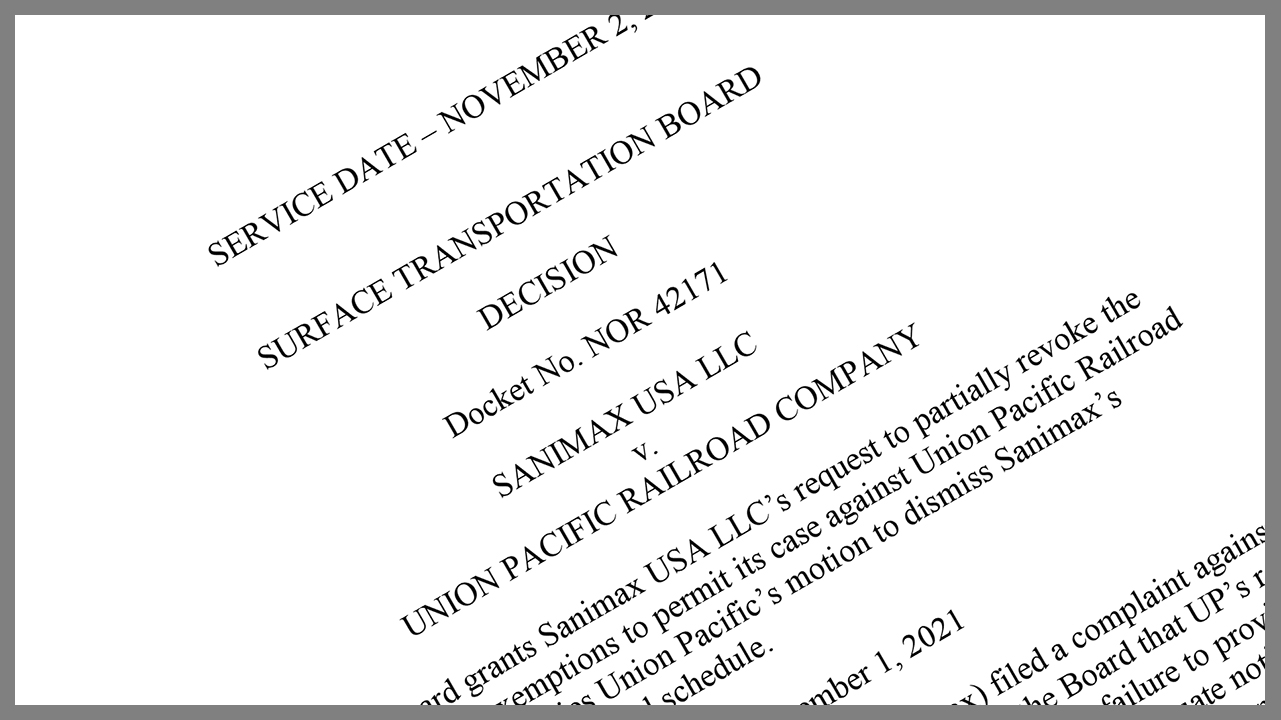
Just What Does STB Consider ‘Reasonable’?
Written by Dr. William Huneke, Consulting Economist
Union Pacific and Sanimax are currently engaged in an interesting bit of litigation. It’s not a rate case or anything I worked on in my more than 15 years at the Surface Transportation Board. The question is whether UP has violated its “common carrier obligation.”
Freight railroads in the U.S. are defined as common carriers by U.S. law. That designation has a long legacy in English common law and it sets railroads aside with special responsibilities, including a “common carrier obligation.” U.S. law and regulation require railroads to provide “service upon reasonable request” to fulfill their common carrier obligation (CCO).
“Service upon reasonable request” turns on the meaning of “reasonable.” The late Justice William Brennan famously opined that he could tell “pornography” when he saw it, but I wonder how he’d do with telling us what was “reasonable.”
Clearly some items are not “reasonable.” The common carrier obligation does not require railroads to ship wild animals. Containers of tigers are not part of the CCO.
If a railroad is not providing service commensurate with its CCO, then the affected shipper can lodge a practice complaint with STB. Sanimax has done so in this case.
If STB finds that a carrier has neglected its CCO, to address the service failure, the agency STB can issue:
- Cease and desist orders.
- Service orders.
- Temporary access orders.
The recent spate of service failures has led shippers to file practice cases and has gotten STB to take an active interest in investigating railroad service problems. Railway Age Capitol Hill Contributing Editor Frank N. Wilner highlighted this discontent in his December column (“Will Bureaucrats Invade the C-Suite?”). So, how did the Sanimax case evolve?
Sanimax receives animal by-products and processes them into biofuels, pet and livestock feed and other items. UP provides Sanimax outbound service, delivering Sanimax products to its customers. Sanimax receives its raw materials by truck but has insufficient storage, so it must continuously process output—otherwise it will have decaying and odorous materials building up in its facilities.
UP originally provided Sanimax with five days per week service. While UP sometimes missed pickups, Sanimax had enough of a margin to avoid a crisis with five days per week service. In August 2020, UP reduced service to three days per week. Sanimax found this level unacceptable because it could not keep processing inbound materials. On Nov. 6, 2020 Sanimax filed an unreasonable practice case, alleging that UP was not meeting its CCO.
UP claims it had to reduce Sanimax’s service to three days per week because that level best met the needs of optimizing UP’s network fluidity and efficiency. UP asserts that Sanimax’s facility has never shut down and rail service has been adequate. Moreover, UP argues that Sanimax should build more resiliency into its processes. UP warns that if STB were to intervene and dictate Sanimax’s level of service, STB would be micromanaging UP’s network.
In rebuttal, Sanimax argues that UP has misstated how poor its service has been. It adds that while UP argues the important of reducing Sanimax to three days per week service, UP has not provided any evidence backing up its argument.
Another wrinkle for this case is that STB had exempted this commodity from economic regulation under authority previously granted by Congress. In the past, the agency exempted commodities whose transportation was not captive to rail. In this case, Sanimax uses multiple modes to receive inbound shipments and sends its outbound products almost exclusively by rail. There is a key question about whether UP, in this case, has a monopoly on outbound traffic that would then require regulatory intervention.
STB granted a partial revocation in November 2021. It took this action so it could get the evidence it needed to consider this case. However, it said it was making no judgment on the merits of the case with the revocation.
Fascinating stuff. I have a couple questions: First: Did the parties try to negotiate a contract that might have included service incentives or penalties? Second: Why didn’t UP offer more service with a higher rate? Contracts are not subject to STB review, and STB cannot use its authority to regulate service to get around rate regulation limitations.
The question for STB is this: If it does issue an order in this case, does STB then become complicit in UP’s ability or inability to achieve its service metrics? What happens if STB directives in this and subsequent cases interfere with network fluidity? After all, STB has spent much effort and focus on monitoring railroad service performance.
This case has been at STB since Nov. 6, 2020. That’s more than two years. STB received the most recent filing on April 18, 2022—than 6 months ago. There’s no statutory decision-making deadline for practice cases like this as there is for rate cases or mergers. It is totally up to STB to finish it when it gets around to it. But when?

Dr. William Huneke is the former Director and Chief Economist at the Surface Transportation Board. He has more than 40 years’ experience in economics, transportation, railroad regulatory policy, management consulting, business analysis and teaching in the commercial and government sectors. He provides economic consulting on regulatory and arbitration matters. At the STB, Dr. Huneke led the Board’s analytical work and oversaw the collection of economic and financial data. Since leaving the STB, he has provided economic and litigation support to Class I railroads and other private-sector clients. He worked with the OECD (Organisation for Economic Co-operation and Development) to advise the Mexican government on its future rail regulatory policy. He represented the United States at an OECD conference on railroad industry structure. His private-sector experience included executive and management positions at UUNET, Freddie Mac and the Association of American Railroads. Dr. Huneke has taught graduate business courses at the University of Maryland, Robert H. Smith School of Business. He holds a doctorate from the University of Virginia and a B.A. from Swarthmore College.



